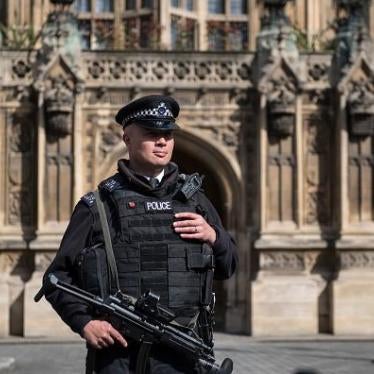(New York) – A new United Nations Security Council resolution aimed at halting cash flows to terrorist groups could put aid workers and human rights defenders at risk of arrest and harm life-saving relief work, Human Rights Watch, Amnesty International, and the International Federation of Human Rights (FIDH) said today.
On March 28, 2019, the Security Council approved Resolution 2462, “Preventing and Combating the Financing of Terrorism,” which requires all UN member countries to criminalize financial assistance to terrorist individuals or groups “for any purpose,” even if the aid is indirect and is provided “in the absence of a link to a specific terrorist act.”
“All countries have an obligation to ensure their population’s safety, but the Security Council resolution on terrorism financing could put ordinary people at even greater risk,” said Letta Tayler, senior terrorism and counterterrorism researcher at Human Rights Watch. “Criminalizing the essential work of aid groups, including by providing food and medicine to civilians in areas controlled by armed extremists, could have disastrous effects.”
Resolution 2462 calls on UN member states to assess their non-profit sectors to determine which organizations are vulnerable to terrorist financing. It fails to define terrorism for the purposes of compliance with its mandates, allowing governments to set their own vague, overbroad, or politically tinged definitions. Terrorism has no universal legal definition.
“There is a real risk this resolution will strengthen the hand of those governments seeking to crush legitimate aid work and human rights defenders by stigmatizing all nongovernmental organizations as potential conduits for financing terrorism,” said Stéphanie David, the UN representative for FIDH.
The resolution informs member states that any clampdowns on terrorist financing need to comply with international humanitarian law, human rights law and refugee law. And it “urges” – but does not require – countries to take into account the potential effect of their counterterrorism financing measures on humanitarian activities protected under international law, such as providing medical care.
However, such boilerplate safeguards may have little effect given the resolution’s expansive interpretation of unlawful aid and its failure to define terrorism, the organizations said. Moreover, the resolution includes no benchmarks for compliance or specific requirements for judicial or other independent review.
Resolution 2462 is the latest of several Security Council resolutions since the attacks of September 11, 2001 that require UN member countries to criminalize terrorist groups and terrorist acts. In practice, these resolutions have allowed countries to craft expansive definitions of terrorism that have been used to stifle internationally protected rights. Numerous studies point to ways in which these resolutions have also curbed principled humanitarian aid.
“The resolution’s generic references to international human rights are not sufficient to protect human rights and aid groups and the people they serve from suffering under this overbroad counterterrorism financing measure,” said David Nichols, senior UN advocate for Amnesty International. “Having enacted this sweeping mandate, the Security Council needs to ensure that countries do not use it as a tool of repression.”








